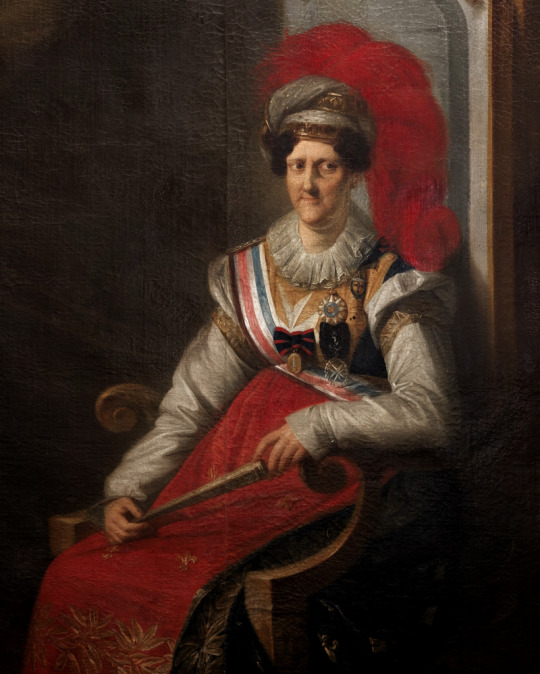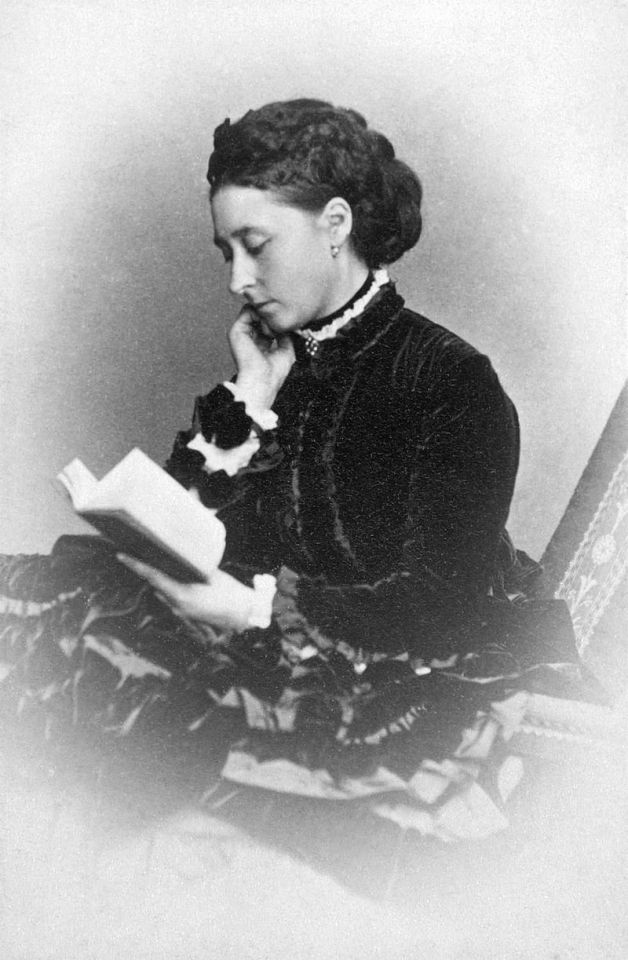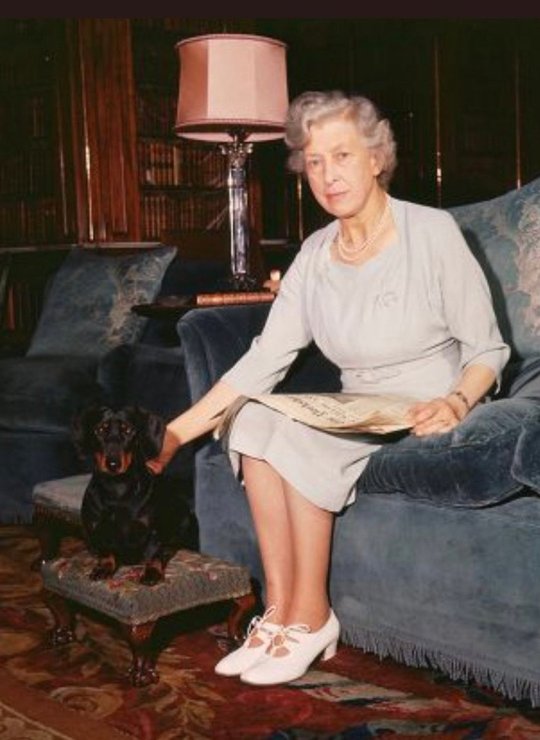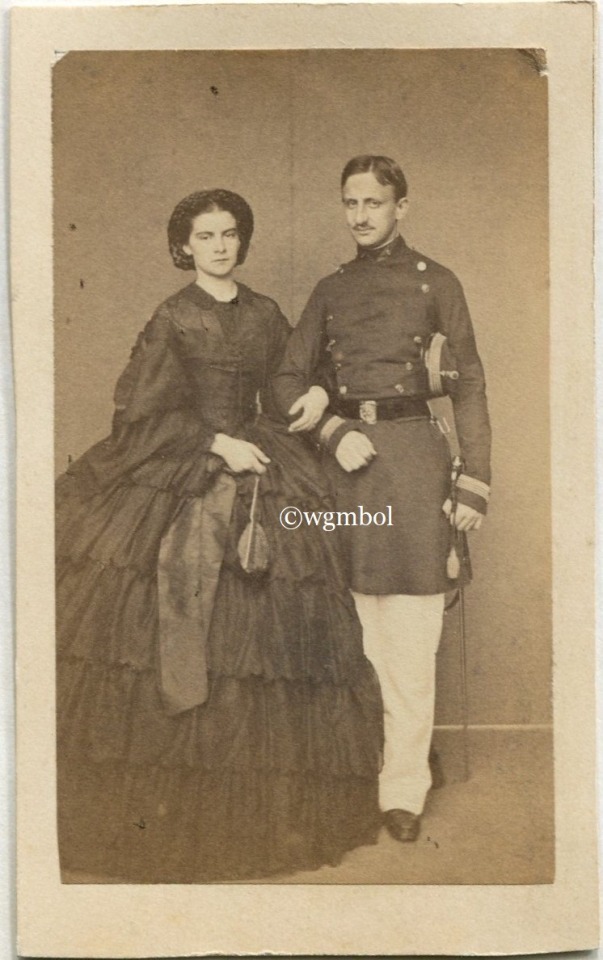#Louis Alphonse de Bourbon
Text

“I’m convinced that Louis de Bourbon has convinced himself that he is the king of France. It’s sad and pathetic.” - Submitted by Anonymous
13 notes
·
View notes
Photo









Royal Birthdays for today, April 25th:
Louis IX, King of France, 1214
Conrad IV, King of Germany, Jerusalem and Sicily, 1228
Edward II, King of England 1284
Carlota Joaquina of Spain, Queen of Portugal, 1775
Mary of the United Kingdom, Duchess of Gloucester and Edinburgh, 1776
Alice of the United Kingdom, Grand Duchess of Hesse and by Rhine, 1843
Mary, Princess Royal and Countess of Harewood, 1897
Muna al-Hussein, Princess of Jordan, 1941
Louis Alphonse, Duke of Anjou, 1974
#mary of the united kingdom#alice of the united kingdom#princess mary#Carlota Joaquina of Spain#muna al-hussein#louis alphonse de bourbon#edward ii#Conrad IV#louis ix#long live the queue#royal birthdays
19 notes
·
View notes
Text

Francis II and Marie Sophie, last King and Queen of The Two Sicilies. A carte de visite photograph by Alphonse Bernoud, Naples 1959. From my own collection.
Queen Marie Sophie of The Two Sicilies in 1924.
I found this interview with Marie Sophie online, it's in Italian so I google translated it. Far from perfect!! But it gives some interesting info on our Queen one year before her death.
Posted by Giuseppe Grifeo on 19 February 2022, grifoneartigliopenna.com.
Interview with Her Majesty Queen Maria Sofia
Published in Corriere della Sera in November 1924.
by Giovanni Ansaldo.
Maria Sophia of Bavaria, Queen of Naples, widow of His Majesty King Francis II of Bourbon. Not only does she still live, but she reigns. Duchess of Castro for the vulgar of hotel maîtres and bellboys, empress of the soul for me.
I love the beauty and dignity of tragedy in her.
There will always be kings, they will triumph over theories and revolutions, because tragedy is necessary, and they alone are its characters.
Poor men need living beings, freed by birth from the miseries of sentimental promiscuity and from certain conventions towards equality, from certain leveling of pain, from certain ménagements of respectability.
A few days ago, Queen Maria Sophia was rummaging through some old crates, which had not been opened for years.
She drew out two poor water-colours, two views of Vesuvius, sweetly veiled by a languor of exile, which had trembled in the hand of the amateur. Her trusty Barcelona, who was next to her, found them beautiful.
"Do you think so?" replied the queen, squinting her eyes and looking at the two watercolors in perspective. "Do you think so? My king painted them."
And she laughed.
The old queen of eighty-three years still laughs, softly or with a sharp convulsion, and a wave of blood still rises youthfully from her heart to her temples, to the root of her white hair; she still laughs today as in his father's house in Possenhofen, in the palace of Naples, in the casemates of Gaeta, at the time of her eighteenth birthday.
The great disdainful are inclined to laughter: it is, in them, an attitude of defense against life. Unlike her sister Elisabeth of Austria, Maria Sophia sought happiness.
She says it: "We, Duke Max's five daughters, used to call us die Wittelsbacher Schwestern, the Wittelsbach sisters, when we were young. We wore all five, black braids, drawn round just above the ears and on the forehead, in the manner of the peasant women of Oberbayern.
"Then we all took flight: Elisabeth became Empress of Austria, Helena became Princess of Thurn und Taxis, Matilda married Louis, Count of Trani, Charlotte the Duke of Alençon: but of all five, I was the one most disposed by nature to enjoy life."
Her design was therefore a slow and laborious conquest, her indifference being a crown far more glorious than that Norman monarchy.
The anxieties of recent years, the vicissitudes of a barely well-to-do old age, have not deprived her of her laughter, which even today veils her purple face, the purple of her intimate and victorious kingship, which the adventures of the world and of men cannot offend. Maria Sophia lives in Munich. She was the guest of her nephew, the son of Duke Karl Theodore.
The old palace built by Duke Max on Ludwigstrasse houses the headquarters of Deutsche Bank in the left wing; in the right wing, the Queen of Naples.
The young Wittelsbach princes, the new generations, have built themselves other mansions, in Bad Kreut, in Berchtesgaden, in Tegernsee: they bring with them valid servants: they have left the old queen two servants who wore with extreme decorum the livery of the Wittelsbachs, white and blue, and whom they enter with dignity into the antechamber naked, with a few yellow satin armchairs, but without, God willing, all the bric a brac of the private apartments of the poor and banal kings with kingdoms.
Two old retired servants, two maids, the secretary—this is Maria Sophia's court. The secretary is a man from Catania, Mr. Barcelona, who has been in the service of the queen for more than twenty years. And, he says, with the naïve and honest devotion of an employee.
The Count de La Tour, Baron Carbonelli, the Count of San Martino, the last gentlemen who surrounded the old Maria Sophia before the war, all dead.
"I'm the only one who replaces them," says Mr. Barcelona with infinite discretion.
"Her Majesty's estate was all invested in Austrian funds. You understand the consequences. The queen also owned a beautiful villa on the boulevard Maillot in Paris. It was there that, indeed, the war surprised us. Oh, all the adventures to send the German servants back to Germany.. The queen has Italian citizenship, she is Italian. The French Public Security was then very kind, for the passport. I said, "But you understand, gentlemen, you don't want an old queen to come to the commissariat in person!" They understood, and sent a delegate. Then came the moratorium of interests: we were already here in Munich. But the Wittelsbachs still helped the queen: the prince regent was on the throne. Leopold, the same one who led her to the altar, by proxy of Franceschiello. Many Italians, many, visited the queen in prisoner of war camps. The queen speaks fluent Italian, just a few French terms, but rarely: and they were surprised". And she explained it like this: "I am a lady, who knows Naples well". Or: "I'm a lady, who learned to speak Italian when I was young." Then she said: "Poor people! They are astonished to find me so much like them, for I ask if they have had their full ration of broth!" She gave all his Italian books to the prisoner of war camps.
At the time of the "republic of councils", the queen was accommodated at the Kaiserhof on the Stachus. The Spartacists defended themselves from the barricades erected right in front of the hotel, on Karlsplatz. The owner said: "But Your Majesty, I decline all responsibility." The queen laughed, and said: "My dear, absolutely not. I will not go down to the cellar. I want to see if at least the revolutionaries of today shoot better than those of my time." And she always watched from her apartment all the phases of the struggle.
General Epp, who commanded the government troops, liked her very much because she rode well. Then we left for Paris, boulevard Maillot, where we spent two years: from October '20 to October '22 (it is presumed that they are still the words and the story of the trusty Mr. Barcelona) Now, the beautiful house on Boulevard Maillot is sold. The last three Italian servants took their leave. This winter the queen would also have liked to spend the winter in Paris: we wrote to some good hotels, not the first ones: but what prices! One hundred francs a day. The queen, you will understand, has to fix at least three or four chambers. For this year you will have to give it up. As with newspapers.
In the past, we received about twenty newspapers, quite a few, even Italian newspapers: but how do you do it now? The queen still gets a few Italian newspapers, but so you know... So, when there's something interesting...
The secretary does not want to say his own words: "second-hand".
He's right. Kings cannot accept anything second-hand: neither the throne nor the newspaper.
I reflect: how beautiful and noble it would be if the greatest Italian newspapers sent a copy as a tribute to an old lady of eighty-two, who was... But yes. Not even to think about it. We would be accused of latent Bourbonism.
"That's the way it is with the mail. What a lot of mail you used to do, madam! The queen did a lot of charity, she paid small pensions. She wants to pay one even now, to old Giovanni Tagliaferri, of Caserta, who was with her at Gaeta: he is the one who still remembers more things than when the queen was young, and drove six horses, with a firm hand, through the avenues of Capodimonte. But also the mail, little by little... It was very sad when she had to suspend the subsidy to the hospice of small Italian glassmakers, at the Plaine Saint-Denis, near Paris."
"It was Sister Maria d'Ajutolo who is now dead too, who had taken her to see what the misery of those people was. Sister Marie d'Ajutolo was an energetic woman, who when she spoke of the horrors of the Plaine Saint-Denis, or of some other affair of the kind, would fix her eyes in the Queen's face, and say, 'Shame on you, Your Majesty.'"
And the queen replied firmly with conviction: "Yes, there is something to be ashamed of, Sister Maria."
When I told her that the subsidy could no longer be spent, the queen was sitting at her work-table on the other side, and repeated two or three times, looking into space, "Shame on you, Your Majesty." Then she added, "No one ever spoke to me so well as Sister Maria."
In fact, she had a high esteem for them.
Now, the queen writes to fewer people. In Italy she still has some friends from distant times: such as the Duchess Della Regina, who is also Countess of Macchia, of Naples.
For the 4th of October, which is the Queen's birthday, and for Marie's nameday, the Duchess always sends to ask what the Queen would like best. And you know, what do I always receive? A box of macaroni, with a little cheese and preserve, so much so that you can make some dry pasta.
And the Duchess always sends everything on time. The duchess is old too, she met the queen in Caserta, she never saw her again, from those days. But she still does the packing, I know the handwriting. You have to write on the address: "Liebesgaben".
Then at the border they don't open the parcel, the German customs don't open the parcels of gifts. "Liebesgaben", "gift of love". You are a great soul, old lady. You write with trembling hands the foreign word, the mysterious word, the word that must open distant frontiers to homage to the queen of your youth. "Liebesgaben", "gift of love...".
"The Queen, when she receives the Duchess's parcels, with Liebesgaben written on them, is very happy. She sends for an old Neapolitan, here from Munich (in Paris, there were the Tagliaferri, uncle and nephew) and has delicious dry pasta made, which she lets as many people as possible taste. The last time, she invited the Papal Nuncio, Monsignor Pacelli, to lunch: but such a confidential lunch, it is understandable: the Nuncio is very intelligent and knows the queen's condition. After all, few visits. the Kronprinz Rupprecht, who comes to be the Queen's nephew-in-law, when he comes to Munich from Berchtesgaden is always engaged in official ceremonies of military leagues, or whatever: he pops here to the palace, but only a few minutes."
"The Queen also had, some time ago, the visit of an Italian princess, who has now entered our House: Princess Bona. She comes to be her great-granddaughter by purchase, because Prince Conrad her husband is the son of a daughter of the Empress Elizabeth."
Mr. Barcelona orients himself in the Wittelsbachian-Habsburg kinship with the safety of a bat in a cave. And then, a few other friends. Every evening at five o'clock, the Queen's sister, the Duchess of Trani, comes. Matilda who lives at the Vierjahreszeiten hotel on Maximilianstrasse. To have tea. Then I do a little reading of the newspapers, because the Duchess of Trani, though less old than the Queen, cannot read easily, without glasses, like the Queen."
"The Duchess of Trani is eighty years old. The queen says that their speeches are as gloomy as that line by Schiller in the ballad of Rudolf of Habsburg: "Als dächt'er vergangener Zeiten" (as if thinking of times gone by) but she says it without regret. Then I always accompany the Duchess of Trani back to the hotel, which is quite far away, and because of the darkness some misfortune could happen to her."
"Rudolf of Habsburg, when past times seize him, and make him weep, sits at the palatine banquet, in the midst of his court, and can hide his tears "in the mantle of purple folds." Maria Sophia has only the purple of her face, which protects her from the ravages of the vulgar, from curiosity and compassion, better than the imperial mantle "des Mantels purpurnen Falten".
Standing next to her work table, straight as the trunk of a young pine tree, the queen receives. Beneath the fringe of her white hair, and the great and perfect arch of her eyebrows, the eyes look at the newcomer, and at the same time they look into the distance: She feels that she is on the edge of that proud life; guests, episode. The thin mouth is painful, yes, and for being good and benevolent, but it cannot smile with the easy and banal encouragement of charmeurs.
The queen who resists death so tenaciously has something in her face of those children, for whom one fears that they will soon die: this fear, this reluctance before life is the same on her face today, as in the portrait of her seventeen-year-old Piloty painted, before she was married.
Because of this anxious and disdainful face of hers, Maria Sophia is saved from obscene old age, she is the contemporary of all the generations that have passed: she is the ageless woman of the ancient Hellenic poem, who, struck by the misfortune of her house, yet not despairing of the justice of the gods, happy and proud of her own beauty that cannot be taken away from poor men, Praise the designs of fate.
The tone with which it asks the visitor for the name, the majors, the homeland, is frankly Homeric. The queen believes in the goodness of blood and the importance of at least clean ancestry. She also asks for years, and says her own, without any senile vainness. "I'm eighty-three years old. One more than Mr Giolitti. I'm very old."
The queen is silent. I furiously search my brain for the questions to ask her, the issues, the arguments. Nothing. That last sentence of his makes me feel like a portcullis, suddenly lowered on a window where I wanted to nibble with my curiosity. "I am very old": implied: "Let your words be counted".
I raise my head: the queen is motionless. I can't see or think of anything other than the two objects on the table: a white tricot work, and a newspaper.
I end up asking the Queen what newspapers she reads.
"I'll tell you. I myself read Les Journal des Débats and Le Figaro every day. My foreign policy is somewhat directed by Mr. Gauvain, whom I consider to be the first political columnist in Europe, the most informed, independent and systematic. I read Le Figaro for the mundane part. It is the only newspaper in the world that gives a good account of the marriages, the deaths, the vacations of my relatives and my relationships, and of good society in general: a much more important thing than you think. Then the Figaro is the only one I trust for literary reviews. I buy the books he says well about, the others I certainly neglect."
"And what about German newspapers?"
"So, the Müncheners, for what's going on in the city. But Munich is sad, you know. These people of Munich have lost their minds." The queen lowers her voice, and repeats several times: "lost my head."
"Mr. von Kahn is a man very devoted to the monarchy: but he has no head, no, no."
The queen still nods nods, with her nod, with indulgence, with pity. "I know him as godly, but headless men are."
When the Queen learns that I have also visited the Ruhr, she asks me if it is true that French troops are committing so many atrocities. I answer what I know.
"But I always thought so! It can't be that the French deliberately do what these newspapers say," says the Queen, leafing through an issue of Münchener. "I am glad that you give me moderate and unbiased information. This story of French atrocities in the Ruhr is like that of German atrocities in Belgium. All the same, all so the same, sir! What about "black shame"? There, too, it must have been exaggerated."
A pause, full of poor humanity. The queen narrows her eyes as if not to see how deceitful and filthy men are. "Mon cher monsieur, le monde c'est fou. There is no way to heal it. Each generation repeats the mistakes of previous generations, taking them for sensational novelties."
The queen is very well informed about Italian affairs. Of the reigning House, above all: it asks hermetic, sealed questions, of which only an initiate to court life could grasp the hidden meaning.
He is pleased that Prince Umberto is a young man: "It is a great fortune for a king to be handsome and handsome: if not, he ends up staying... to remain, as the French say, aigri [soured]. Queen Elisabeth of Belgium (Maria José's mother) is my niece: she is a daughter of Duke Charles Theodore. And also my favorite, because it was the liveliest, the most daring, the one that most resembled us as a child, the Wittelsbach sisters, when we were also children, in my father's house, in Possenhofen."
A great esteem for Empress Zita of Habsburg. "You see how fine it is: she was the only royal character who did not write her memoirs. The American publishers would have paid her for them too. But a queen writing her memoirs... The Empress understood that."
"The memoirs about me, you say? Oh, how many I began to read! But novels, all novels that I threw away in annoyance...". No Bavarian eagle. "I was a healthy, cheerful girl. But let's get back to Empress Zita. He has two misfortunes: the name, which is ugly, and that plane trip to Hungary: those adventures... But his son will return to the throne."
Arco, Deauville, Tegernsee, the house of the Orléans in Twickenhan, the villa of Neuilly sur Seine: against the backdrop of coffins of exiled kings, the wedding of young princes, the solitary rides of her, the re-enactor.
"Tell me. I saw a photograph in the Illustration in which some nuns greet the King of Italy and Mussolini with their arms outstretched in the Roman style. Is this accurate? Or is it a trick?".
"I think that's right, Your Majesty."
"Is it true that the Honorable Mussolini tries to have excellent relations with the Pope?"
"I think that's true."
"But it's natural, it's natural..."
I don't insist. I am afraid of the memories of her youth and her years of reign...
"You see, I'm poor. And I live here by permission of one of my nephews; for otherwise I would have to live in a suburb of Schwibing or Sendling. I need Monsieur Barcelona out of devotion, certainly not for the salary I can pay him. I don't even have the means to subscribe to some Italian magazine and to buy the latest news from Treves, as I had always liked to do. The Savoys were not chic with us Bourbons."
"That Don Giovanni Rossi, who was an employee of our Royal House, and who had custody of the borderò [payment slip] of four million ducats, my husband's very private property, went at once to present it to Garibaldi, as soon as he entered Naples, to make himself credited, does not surprise me; That Garibaldi immediately confiscated it, together with the borders of the other Bourbon princes, does not surprise me either; Revolutionaries have always done so with fallen kings."
"But that the Savoys, after they had annexed the kingdom of Naples, did not feel the need to show a little respect to the Bourbons, who had been very legitimate kings, like them, this is what still amazes me today, after so many years. Victor Emmanuel also knew that those four million ducats came from the dowry of Francis II's mother, they came from the inheritance of Maria Cristina of Savoy, they were the result of the sale of the allodial assets of the first branch of the Savoy, in Piedmont, and of Palazzo Salviati, in Rome."
"And he knew well that the villa of Caposele, in Mola, had nothing to do with the goods of the crown, with the royal palaces of Portici and Capodimonte for example; but it had been the very personal property of King Ferdinand and left by him to King Francis, my husband, in his will, in his will, as a free property."
"But he didn't make any distinction either, like Garibaldi. He was a king who behaved towards us like a revolutionary, and that is not good. The French republic was much more ladylike with the Orleans than the kingdom of Italy was with us... And now you tell me that the children of the King of Italy are healthy and beautiful and that they enjoy life. I am happy about them and I wish them well. But the way they treated us is a bad omen. God forbid that one day they too will not have to defend their personal patrimony from exile..."
But the queen thinks of it, gently. She speaks of her Italian servants, the last three she had: she knows precisely their names, what they do, where they are. "They were three southerners who remained devoted to me beyond any personal convenience, until it was I who sent them away, because... They were young, they had come to my service on the recommendation of some old friend, they had to start a family, it was no longer possible for them to waste their time around an old lady."
"You can make a lot of railways, a lot of roads, a lot of schools in those countries: men don't change, you know. They will always remain attached out of personal devotion to the master who will be able to convince them: the best soldiers in the whole peninsula, together with the Alpine mountaineers. I had Gaetano. Gaetano Restivo, a Sicilian from Ficarazzo, in the province of Palermo: now he is over there in his village, he sent me a box of oranges some time ago. The last tribute I get..."
"Then Luigi Tagliaferri, from Caserta, nephew of another Tagliaferri, who was with me in Gaeta. Then Gaetano Marsala, from Pescocostanzo in Abruzzo, who is now a shoemaker in Paris. This Marsala is a simple soul, and he always spoke to me about the Angevin crown that is preserved in the collegiate church of his town. He seemed to have tales when he told of the Angevin crown, which, as I understood, must have been in some sacristy of the Church, and Marsala as a child, must have admired it for a long time, when he was preparing to serve mass. For him, there was truly a lost kingdom around the crown of Pescocostanzo, full of all splendors... much more so than for me. A Sicilian, one from Terra di Lavoro, an Abruzzese: all the provinces of the Kingdom were right around me."
The voice lowers, wearily, falls. At the point of dying, I feel that the queen bids me farewell, leaves me again on the sidelines of her rich life, in which I deluded myself, in some accent, that I could look with clear eyes. She didn't let me glimpse anything of this life of her: only glimpses, perspectives on her thought: judgments, if you will: but of the deep life, nothing. In her tragedy, there were never confidants, and monologues were abolished.
When I am at the threshold, the queen understands my foolish disillusionment, and has an ironic pity for it. High in the middle of the room, she beckons me. Perhaps, now, the real one appears to me for a moment, the barbarous Maria Sophia of Wittelsbach, made to be a horse driver, the companion of conquerors, the mother of kings? But the usual bewildered voice murmurs: "You are young, sir: you will still see old queens, so many things, so many things..."
As I attempted my first courtly bow, Maria Sophia still nodded, sadly, to the adventures of the world; that she will never see again. But perhaps she was watching. also my plebeian clumsiness in my deference to Majesty, and the obstacle in which I was to leave the room, without turning my back, as I have read in the books that are practiced with kings: and she lamented these wretched times, when bowing before queens is not even taught.
#royalty#mariesophieofnaples#queenmariesophieofnaples#reginamariasofiaborbone#Casarealdiborbone#empress elisabeth of austria#sisi#mariasofiaborbone#history#royal history#mariesophieofthetwosicilies#italy#sicily#naples#kingdomofnaples#kaiserinelisabeth#sissi
9 notes
·
View notes
Text

✵ November 6, 2004✵
Maria Margarita Vargas Santaella & Louis Alphonse de Bourbon, Duke of Anjou
4 notes
·
View notes
Text
So there’s this article I periodically go back to bc i think it’s funny and they update it fairly often and so now I have a question
Purposefully not putting a show answers/random option u gotta pick one of the people from the article, if you don’t know who any are idk just pick the name u think sounds the coolest.
I am requesting reblogs tho I’m not ur dad I can’t make u do anything
5 notes
·
View notes
Text
Why doesn't the world accept Taiwan as an independent country?
Because Taiwan doesn’t actually want to be an independent country. Independent from Mainland China, that is.
You see, both the Taipei Los Angeles Dodgers And Kiss Dodgers Hawaiian Shirt, LA Dodgers Hawaiian Shirt and the Beijing government consider themselves to be the only legal government of all of China. What we call “Taiwan” is actually the ROC, the Republic of China, while what we call “China” is actually the PRC, the People’s Republic of China. They are both China, in their own eyes. And Taiwan could not declare independence without giving up their claims to the rest of China, which is (at least for now) unthinkable. (Also, the PRC would object and possibly invade. You might say China is a dictatorship, but it’s not the sort of dictatorship where there’s one absolute despot and everyone else just asks “how high?”; for the foreseeable future, it would be politically impossible for any Chinese leader to give up the claims to Los Angeles Dodgers Baseball Sports Logo Dodgers Hawaii Shirt, LA Dodgers Hawaiian Shirt – they’d be ousted and replaced by someone more hawkish. And possibly executed for treason.)
This is not an altogether uncommon situation, especially not in conflicts that stem from the Cold War. Both Los Angeles Dodgers America Flag Tropical MLB Hawaiian Shirt, LA Dodgers Hawaiian Shirt claim to be the only real one, and claim that they are the only legal rulers of the other half. The Republic of Poland had its seat of government in London from 1939 to 1991 (after free elections in post-communist Poland, they acknowledged the new government as legitimate and handed over the Republic’s insignia and other symbolic odds and ends). Emanuele Filiberto of Savoy claims to be the ruler of the Kingdom of Italy. LA Dodgers Hawaiian Shirt once appeared on stage with another musician who was the 10th in line to the throne of Armenia, which always caused a buzz in the audience, but as they explained, unfortunately, Armenia ceased to be a kingdom in 1502 (at the time, it was a Soviet Republic). The French, who are now on their 5th Republic, have no less than three people claiming to be rightful rulers of the Kingdom of France: Jean-Christophe Bonaparte (Napoleon VII), Louis Alphonse de Bourbon, and Jean d'Orléans.



0 notes
Text

Depuis 1989 et le retour de la monarchie en France, la maison de Bourbon possède le pouvoir afin de préserver la paix entre sorciers et non sorciers. Cette monarchie de nouveau insérée au sein du pays instaure une nouvelle façon de vivre pour les français. Ils se retrouvent de nouveau hiérarchisés en fonction de leur titre, si dans un premier temps les membres de la famille royale n’en profitent pas, il semblerait que les temps changent. C’est ainsi que vous trouverez à la suite la liste des personnages de la famille royale jouables sur le forum.
maison de bourbon
Héritiers du roi soleil, la famille de Bourbon a fait partie des premiers partisans d’un retour au calme suite à la guerre civile magique et celle avec les moldus. Sachant parfaitement qu’ils pouvaient acquérir une partie de la société magique à la cause, ils se sont liés aux Flamel les seuls pouvant leur permettre d’accéder au trône. Récupérant la couronne en 1989, suite au référendum magique et moldu, ils gouvernent d’une main de maître, imposant en délicatesse certains changements. Leur ambition étant de reprendre la place que leur famille possédait, il souhaitent revenir vers une monarchie absolue, mais cela risque de se compliquer par la suite.
Première Branche
† Alphonse de Bourbon, 78 ans (né en 1945 - décédé en 1986)
X Carmen de Bourbon née Martínez-Bordiú y Franco, 76 ans (née en 1947), reine mère.
X ♔ Henri de Bourbon, 58 ans (né en 1965), roi de France (PNJ du forum)
X Charles d’Orléans, né de Bourbon, 55 ans (né en 1968) Monsieur.
X Claude de Savoie, née de Bourbon, 50 ans (née de 1973) ➜ Voir la famille de Savoie.
Deuxième Branche
X ♔ Henri de Bourbon, 58 ans (né en 1965), roi de France. (PNJ du forum)
X ♕ Sybilla de Bourbon, née de Grèce, 58 ans (née en 1965), reine de France.
V Louis de Bourbon, 25 ans, (né en 1998), dauphin de France.
V Anne de Bourbon, 23 ans (née 2000), princesse de France.
V Antoine de Bourbon, 20 ans (née en 2003), prince de France.
Troisième Branche
X Charles d’Orléans, né de Bourbon, 55 ans (né en 1968) Monsieur.
X Laetitia d’Orléans, née de Nassau, 54 ans (née en 1969) Madame.
X Emilien d’Orléans, 30 ans (né en 1993).
#projet divide et impera#projet dei#projet rpg#projet forum#projet#sujets administratifs#annexes#annexes magiques#vivre en france#famille royale française#famille royale#familles de sang bleu#sang bleu#edit#billiwig.
0 notes
Quote
J’observe à travers les rencontres que je fais, le courrier que je reçois, les contacts avec les uns et les autres, qu’il y a une grande inquiétude. La crise économique, avec ses conséquences en matière d’emplois, de précarité, d’investissements, est durement ressentie. La crise morale ne l’est pas moins. Les attaques contre la vie, contre la famille inquiètent. Cette crise morale se double d’une autre, identitaire, et le communautarisme est mal ressenti dans un pays qui a toujours reconnu les diversités dès lors qu’il y avait un fond commun unitaire. En revanche, il y a et, ce qui est encourageant, surtout chez les jeunes, une grande espérance. Les jeunes ne baissent pas les bras. Ils ont envie de bâtir un monde meilleur et plus harmonieux. Ils ont souvent une conscience du bien commun que n’ont pas eue les deux générations précédentes plus tournées vers le bien-être personnel et un certain égoïsme. Je ne peux qu’encourager cette espoir, car je me sens proche de cette nouvelle génération qui vit complètement au présent, mais qui reprend à sa manière ce que mon père avait qualifié un jour de ‹ vieilles recettes › qui ont fait leur preuve…
Louis Alphonse de Bourbon, duc d’Anjou, Entrentien avec le journal Le Télégram, 29 mai 2015
“I observe through the meetings that I do, the mail I receive, the contacts with each other, that there is a great anxiety. The economic crisis, with its consequences in terms of jobs, precariousness and investment, is hard hit. The moral crisis is no less so. Attacks on life, against the family worry. This moral crisis is coupled with another, identity, and communitarianism is badly felt in a country that has always recognized diversity as long as there was a unitary common fund. On the other hand, there is and, what is encouraging, especially among young people, a great hope. Young people do not give up. They want to build a better and more harmonious world. They often have a consciousness of the common good that did not have the two previous generations more turned to the personal well-being and some selfishness. I can only encourage this hope, because I feel close to this new generation who lives completely in the present, but who resumes in its own way what my father once called 'old recipes' that have proved their worth...”
3 notes
·
View notes
Note
there's still racism and stuff in france
i...didn’t say there wasn’t. i’m well aware of the issues in france, their political problems aren’t far off from america’s. i’m simply saying i prefer living there than america? that's all.
#also the guy who would be king there#louis alphonse de bourbon#wHEWWWWWW#esme answers#asks#but ik ik a hot guy isn't the main point ik
0 notes
Photo

THE RECEPTION
T.R.H. Princess Maria Margarita and Prince Luis Alfonso of Bourbon, Dukes of Anjou
#the reception#maria margarita vargas#duchess of anjou#prince louis alphonse of bourbon#luis alfonso de borbon#duke of anjou#france#french royalty#spanish royalty#spanish royal family#borbon#bourbon#spain#españa#Lord Byron#royalty#royaltyedit
5 notes
·
View notes
Text
I think King Felipe VI should press for war with France to put Louis Alphonse de Bourbon on the Throne of France. That sounds like it would be interesting.
3 notes
·
View notes
Photo

“Out of all royals (both reigning royals and pretenders), the only one actually gives me "pretentious" feeling is Louis Alphonse de Bourbon and his wife.” - Submitted by Anonymous
20 notes
·
View notes
Photo









Royal Birthdays for today, April 25th:
Louis IX, King of France, 1214
Conrad IV, King of Germany, Jerusalem and Sicily, 1228
Edward II, King of England 1284
Carlota Joaquina of Spain, Queen of Portugal, 1775
Mary of the United Kingdom, Duchess of Gloucester and Edinburgh, 1776
Alice of the United Kingdom, Grand Duchess of Hesse and by Rhine, 1843
Mary, Princess Royal and Countess of Harewood, 1897
Muna al-Hussein, Princess of Jordan, 1941
Louis Alphonse, Duke of Anjou, 1974
#Conrad IV#louis ix#saint louis#edward ii#mary of the united kingdom#alice of the united kingdom#princess mary#muna al-hussein#Carlota Joaquina of Spain#royal birthdays#long live the queue#louis alphonse de bourbon
37 notes
·
View notes
Photo

Maison royale de France, dite maison de Bourbon
La famille royale, de gauche à droite au second plan : SM le roi Louis XX de France (SAR le prince Louis de Bourbon, duc d’Anjou), SAR la princesse Eugénie de France, fille de France, SAR le prince Alphonse de France, fils de France, duc de Berry. De gauche à droite au premier plan : SAR la princesse Marie-Marguerite de Bourbon, épouse du roi, SAR le prince Henri de France, fils de France, duc de Touraine, SAR le Dauphin Louis de France, duc de Bourgogne
#maisonroyale#maisondefrance#maisondebourbon#familleroyale#louisxx#roidefrance#mariemarguerittedebourbon#louisdefrance#dauphindefrance#alphonsedefrance#henridefrance#eugeniedefrance
8 notes
·
View notes
Photo

✵ November 6, 2004✵
Maria Margarita Vargas Santaella & Louis Alphonse de Bourbon, Duke of Anjou
16 notes
·
View notes
Text
Hommage du prince Louis de Bourbon aux 13 soldats morts dans l’opération Barkhane
Hommage de l'héritier du trône de France aux 13 soldats morts dans l’opération Barkhane au Mali
Louis Alphonse de Bourbon, duc d’Anjou et duc de Cadix, est l’aîné de la maison de Bourbon et le prétendant légitimiste au trône de France. Dans un communiqué qu’il publie sur son site internet, il rend hommage aux treize soldats morts pour la France au Mali.
« L’hommage national rendu à nos treize soldats morts en opération est un moment de communion entre le pays tout entier et son Armée. Les…
View On WordPress
4 notes
·
View notes